Why Were American Soldiers Called Yankees And Where Does Yankee Doodle Come From?
Conny Waters - AncientPages.com - No one knows exactly where the term "Yankee" comes from but in the mid-1700s it was used by the English as an insulting name for the colonists in the American colonies.
The expression possibly derives a Cherokee word "eankke" which has a negative overtone and means "coward", a word that the Cherokees used on the European colonists.
In the rest of the USA, the word had also later a negative meaning. In the U.S. Civil War (1861-65) the inhabitants of Southern talked about the enemy in the north as "Yankees".
Another possible explanation is that the term comes from the Dutch name and nickname "Janke". The English colonists used to call by this name the Dutch living in the area around today's New York and New Jersey.
The term "Yankee" spread among the Englishmen during the American War of Independence (American Revolution), which was fought 1775-1783.
Even a well-known British song, "Yankee Doodle" originates from this particular period. The U.S. revolutionists assimilated quickly the song which became a sort of anthem for the rest of the war.
It gave them a feeling of being special and certainly better than the British.
Yankee soldiers themselves were proud of the name "Yankee" and after the victory in the American Civil War (1861-1865), "Yankee Doodle" became soon a designation for American soldiers in general.
In a paper upon the origin of ‘Yankee Doodle’, read before the New York historical society, George H. Moore stated the word ‘Yankee’ is pure Dutch. According to Moore the “vocabulary of the early New York Dutch, meant ‘to grumble, snarl, or yelp, and its derivate noun meant ‘a howling cur’. 1
We do know that New York was once called New Amsterdam and it was the capital of New Netherland.
New York’s name history can be traced to a time during the 17th century when Britain, France and the Netherlands all struggled to expand their territories and establish more colonies.
The Basque Name For God Is ‘Yainkoa’ - An Interesting Connection
There are of course some speculations how the New York Dutch got its name, and there are researchers who suggest it came from the Indians. “Peter Martyr says that Sebastian Cabot named the coasts of Newfoundland and thereabouts the land of baccalaos because in the seas he found a multitude of large fish which the natives called by that name. This word ‘baccalaos’ was used by the Basque fishermen, and meant ‘codfish’; and, if the natives used it, it was only after they had learned it from the Basques.
See also:
What Is The Avoidance Custom Of The Amish People In Pennsylvania?
Bill Of Rights 1689 – Enormous Historical Moment In English History
Sailors are proverbially profane, and most likely these sailors of the olden time made use of the name of the Deity, much as sailors do at present day. The Basque name for God is ‘Yainkoa’, and no doubt it was frequently used by the fishermen: so frequently indeed, that the Indians called the strangers by it, just as the little urchins of Havre and Dieppe now call the Eglish tourists ‘ Meestaire Goddam’.
The Indians employed the term to indicate a foreigner, and from them, the early colonists learned it. It may afterwards have passed into a word or term of contempt, but it had its origin in the attempt to pronounce the Basque word ‘Yainkoa’. 1
Today, "Yankee Doodle" is not only the official song for the State of Connecticut but it has been widely adopted in the United States and it is often sung in a truly patriotic manner.
The official external radio and television broadcasting service, the Voice of America, which broadcasts by satellite, on FM, AM, and short-wave radio frequencies, begins and ends all broadcasts with the interval signal of "Yankee Doodle"!
It broadcasts in forty-six languages so the "Yankee Doodle" song is heard around the world!
Written by Conny Waters – AncientPages.com Staff Writer
Copyright © AncientPages.com All rights reserved. This material may not be published, broadcast, rewritten or redistributed in whole or part without the express written permission of AncientPages.com
Expand for references- E. Slevin. "Yankee." Science7, no. 153 (1886): 32-33.
More From Ancient Pages
-
 Fluctuating Oxygen Levels May Have Accelerated Animal Evolution
Archaeology | Oct 19, 2022
Fluctuating Oxygen Levels May Have Accelerated Animal Evolution
Archaeology | Oct 19, 2022 -
 Gigantic Viking Age Burial Ground With Artifacts And 50-Meter-Long Shipwreck Unearthed In Tvååker, Halland, Sweden
Archaeology | Oct 18, 2024
Gigantic Viking Age Burial Ground With Artifacts And 50-Meter-Long Shipwreck Unearthed In Tvååker, Halland, Sweden
Archaeology | Oct 18, 2024 -
 Tomb Of A 1,000-Year-Old Sican Surgeon Wearing A Golden Mask Discovered In Peru
Archaeology | Mar 30, 2022
Tomb Of A 1,000-Year-Old Sican Surgeon Wearing A Golden Mask Discovered In Peru
Archaeology | Mar 30, 2022 -
 Unique Viking Silver Treasure With Beautiful Jewelry And Rare Coins Found In Täby Outside Stockholm, Sweden
Vikings | Jun 12, 2025
Unique Viking Silver Treasure With Beautiful Jewelry And Rare Coins Found In Täby Outside Stockholm, Sweden
Vikings | Jun 12, 2025 -
 Drought Triggered Civil Conflict Among The Ancient Maya – Study
Archaeology | Jul 20, 2022
Drought Triggered Civil Conflict Among The Ancient Maya – Study
Archaeology | Jul 20, 2022 -
 Mystery Of Ancient Roman Concrete That Still Stands Strong – Has A 2,000-Year-Old Engineering Puzzle Been Solved?
Ancient Technology | Jul 5, 2017
Mystery Of Ancient Roman Concrete That Still Stands Strong – Has A 2,000-Year-Old Engineering Puzzle Been Solved?
Ancient Technology | Jul 5, 2017 -
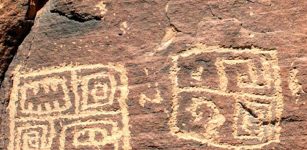 Controversial Evidence – Ancient Chinese Visited America 2,500 Years Ago
Civilizations | May 9, 2015
Controversial Evidence – Ancient Chinese Visited America 2,500 Years Ago
Civilizations | May 9, 2015 -
 3,000-Year-Old Twisted Gold Torc Discovered In Essex
Archaeology | Jul 15, 2023
3,000-Year-Old Twisted Gold Torc Discovered In Essex
Archaeology | Jul 15, 2023 -
 900-Year-Old Crypt At Old Dongola: Magical Inscriptions And Mysterious Signs Found
Archaeology | Sep 12, 2015
900-Year-Old Crypt At Old Dongola: Magical Inscriptions And Mysterious Signs Found
Archaeology | Sep 12, 2015 -
 World’s Oldest Tattoo Tools Discovered In Tennessee, North America
Archaeology | May 2, 2018
World’s Oldest Tattoo Tools Discovered In Tennessee, North America
Archaeology | May 2, 2018 -
 DNA From Mysterious Hominin In China Suggests Native Americans’ East Asian Roots
Archaeology | Jul 14, 2022
DNA From Mysterious Hominin In China Suggests Native Americans’ East Asian Roots
Archaeology | Jul 14, 2022 -
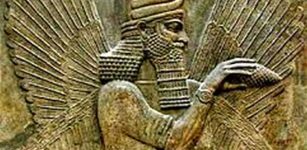 Glory And Fall Of Babylon Dedicated To The Cult Of Marduk
Featured Stories | Oct 11, 2016
Glory And Fall Of Babylon Dedicated To The Cult Of Marduk
Featured Stories | Oct 11, 2016 -
 Vedic God Indra: Ruler Of Heavens And Tough Warrior Who Kills Evil Serpent Vritra
Featured Stories | Feb 1, 2019
Vedic God Indra: Ruler Of Heavens And Tough Warrior Who Kills Evil Serpent Vritra
Featured Stories | Feb 1, 2019 -
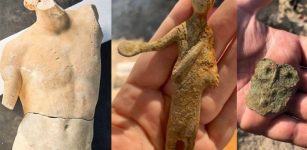 Magnificent 2 Meters Tall Marble Apollo Statue And Other Artifacts Found In San Casciano dei Bagni, Italy
Archaeology | Nov 20, 2023
Magnificent 2 Meters Tall Marble Apollo Statue And Other Artifacts Found In San Casciano dei Bagni, Italy
Archaeology | Nov 20, 2023 -
 New Paintings And Details Uncovered In The Egyptian Temple Of Esna
Places | Oct 22, 2024
New Paintings And Details Uncovered In The Egyptian Temple Of Esna
Places | Oct 22, 2024 -
 Evolution Of Tree Roots Led To Ancient Mass Extinctions – Geologists Say
Archaeology | Nov 11, 2022
Evolution Of Tree Roots Led To Ancient Mass Extinctions – Geologists Say
Archaeology | Nov 11, 2022 -
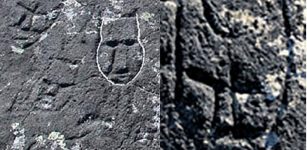 Dorset Culture: Mysterious Rock Carvings Of Qajartalik – Faces Of Unknown Beings
Civilizations | Sep 3, 2018
Dorset Culture: Mysterious Rock Carvings Of Qajartalik – Faces Of Unknown Beings
Civilizations | Sep 3, 2018 -
 More Than 10,000 Pre-Columbian Earthworks Remain Hidden Throughout Amazonian Forests
Archaeology | Oct 5, 2023
More Than 10,000 Pre-Columbian Earthworks Remain Hidden Throughout Amazonian Forests
Archaeology | Oct 5, 2023 -
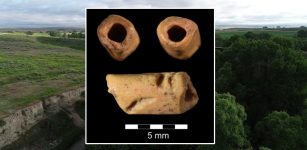 Oldest Bead In America Discovered At La Prele Mammoth Site, Wyoming
Archaeology | Feb 13, 2024
Oldest Bead In America Discovered At La Prele Mammoth Site, Wyoming
Archaeology | Feb 13, 2024 -
 Incredible Ancient Star Map Depicting Our Galaxy Is Hidden In Africa
Ancient Mysteries | Aug 4, 2018
Incredible Ancient Star Map Depicting Our Galaxy Is Hidden In Africa
Ancient Mysteries | Aug 4, 2018

